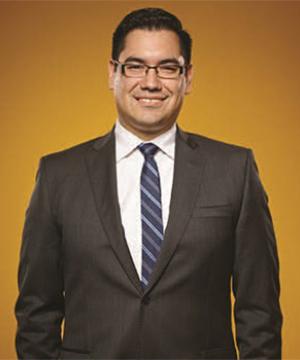Trevor Reed ’18 on the Careers in Law Teaching Program
Associate Professor, Arizona State University Sandra Day O’Connor College of Law
Columbia Law School’s Careers in Law Teaching Program (CILTP) has a long history of preparing students and alumni for jobs in academia. CILTP provides comprehensive guidance, including one-on-one mentorship, job-talk training, moot interviews, and preparation for the annual Association of American Law Schools Faculty Recruitment Conference in Washington. We talked with six alumni whose experiences with the program helped guide them toward faculty positions at law schools across the country.
Trevor Reed is a scholar who explores the social impacts of intellectual property law on individual and group autonomy. His recent work focuses on the linkages between creative production and Native American sovereignty, which has involved community-partnered research coupled with on-the-ground efforts to repatriate indigenous intellectual properties from museums, archives, and other holding institutions back to local communities. He teaches courses in federal Indian law and intellectual property. His recent publications include “Who Owns Our Ancestors Voices?” in the Columbia Journal for Law and the Arts and “Reclaiming Ownership of the Indigenous Voice” in the Oxford Handbook of Musical Repatriation. Reed has a B.M. from Brigham Young University; an M.A. in arts administration from Teachers College, Columbia University; and a Ph.D., M.Phil, and M.A. from Columbia University Graduate School of Arts and Sciences. He is also an active musician and composer.
How did the CILTP prepare you for your academic career?
Before I received my J.D. from Columbia Law, I was unexpectedly approached by Arizona State University (ASU) Law to apply for a tenure-track position. I had no idea how to prepare an academic CV or a research agenda. The program provided me with both from several recently hired Law School faculty members and shared several resources for how to prepare for an interview and job talk. I was told later by my colleagues at ASU Law that I had one of the most compelling research agendas they had ever seen.
When did you decide that you wanted to pursue a career in academia?
My goal throughout graduate school was to eventually spend my career promoting and protecting indigenous peoples’ (and other marginalized groups’) creativity and innovation. As an artist myself, I couldn’t understand why indigenous creativity was so undervalued in the marketplace, and yet it seemed that indigenous culture could be so easily appropriated by anyone without consequence. I explored careers ranging from nonprofit economic development organizations to law firms but couldn’t find a career path that would let me combine my passion for research, the teeth of social justice, and the kind of community-building that motivated me as an artist.
Fortunately for me, two professors whom I had long admired pulled me aside and asked if I had ever considered applying for a faculty job. They explained that while being a professor carries important research, teaching, and service responsibilities, academic careers allow you to pursue projects that matter to you—particularly after tenure—without the instability that accompanies many community-oriented careers in the nonprofit sector.
Are there any Columbia Law professors whose teaching style was inspirational and had a significant impact on your career choice?
I think each professor I had at CLS gave me something that has since inspired my teaching. Professor Vincent Blasi, for example, helped me to reenvision what a discussion-based law classroom could look like. Professor Robert Scott helped me understand how to unpack cases in a way that helped me see myself as an attorney.
What advice do you have for current J.D. students or recent graduates who are considering academic careers?
Acquire all the tools you need to pursue the research you are passionate about. Many people say there is a formula for being competitive on the faculty job market: perfect grades, law review editorial board, clerking, having a couple of years of firm experience, a fellowship. One reason I didn’t pursue an academic career track initially was because I thought my qualifications weren’t good enough. What I didn’t realize was that each faculty is different, and many if not most of the legal scholars I know value diversity of research backgrounds and interdisciplinary approaches as well as traditional markers of scholarly potential. Don’t count yourself out.
What is the best thing about teaching?
I do really enjoy that moment when a complex body of doctrine clicks for students.
# # #
Published on March 21, 2019
